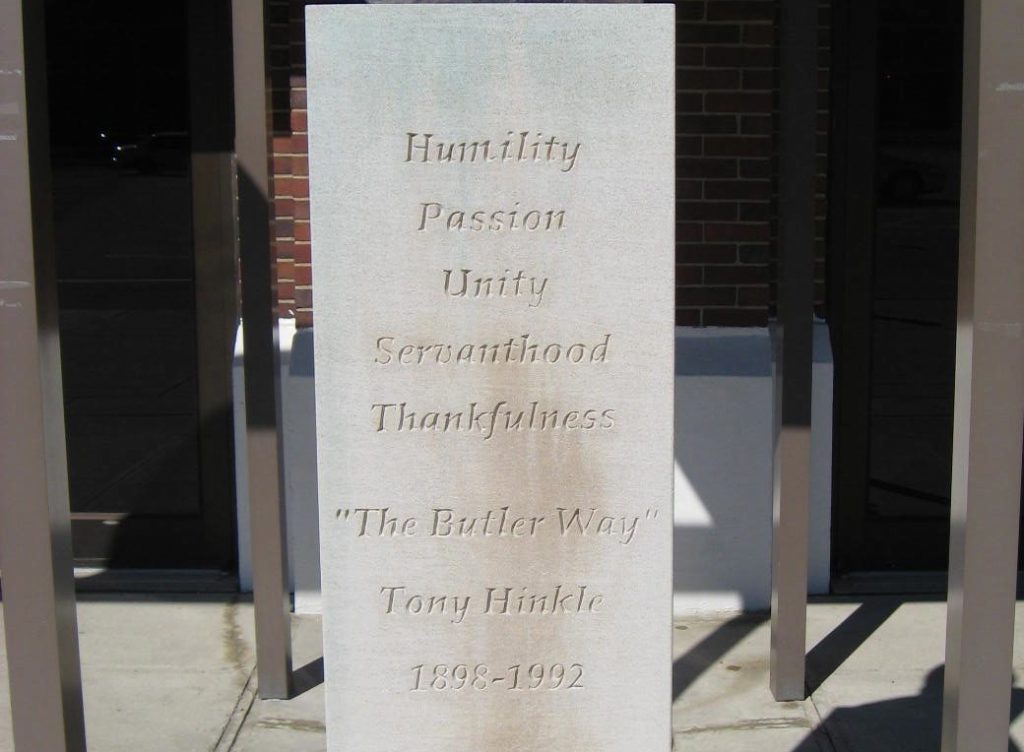Among the teams in the American NCAA national college basketball tournament, one stands out particularly: the Butler Bulldogs from Butler University in Indianapolis. A small team from a small university (and thus on a small budget), they set records and go against the standard practices of college basketball. Their secret ingredient? Not a big exceptional star, but the humility of all in service of the team!
1,2,3 Butler – We fight Together! – What will we be? Champions!
t's 6 in the morning, the first Thursday of November 2017, and you can already hear the squeak of the Butler Bulldogs' (men's basketball team) shoes on the floor of the Butler University gymnasium in Indianapolis. Their goal: the NCAA (National Collegiate Athletic Association) playoffs. Nothing less.
It must be said that they have good reasons to hope, since they have already been crowned runners-up in 2010 and 2011, thus becoming the smallest university to reach the NCAA playoffs two consecutive years. Led at the time by coach Brad Stevens (head coach of the Boston Celtics since 2013), he set two new records for this competition: youngest coach to take his team to the finals twice, and he also won more games in his first four years as a coach than anyone in the history of this competition. Pretty impressive.
.jpg?width=553&height=369&name=brad-stevens-and-butler-bulldogs%20(1).jpg)
But Brad isn't the only reason for this team's success. Nor is it an exceptional budget allocated to recruit the biggest stars in the country, because their budget is actually quite meager.
Their secret weapon: humility. Yes, because unlike what is usually seen in the world of sports (and more broadly in any competitive context), superstars with oversized egos and talent are not considered an asset here, but rather a hindrance to the team's success.
Team members with low egos serving the collective success before their own personal success... hmm, it strongly echoes the philosophy Sea Smoke Cellars applies to making the best pinot noir possible (they call it egoless leadership and management).
At Butler Bulldogs, they call it the "Butler Way": humility, passion, unity, recognition, and servant leadership. This philosophy and these values have been at the heart of this team since 1920, instilled at the time by the legendary coach and athletic director Tony Hinkle (coach of the Bulldogs from 1926 to 1992). For a little anecdote, he is also the man behind the orange color of basketballs (to distinguish them clearly on the court). A great man indeed :)
If you want humility in a team, it helps to have a leader who lives it - Adam Grant, Organizational Psychologist

The role of Tony, Brad, and today his successor Laval Jordon, is to ensure that players don't try to become individual stars at the expense of the team. But to create a culture of humility, it's not enough to gather a few tall guys with long arms and great humility. What does the Butler Way mean in practice?
For example, it means: no team captain, but TEAM captains. In 2008, when he was just named head coach of the Butler Bulldogs, Brad had to decide who to appoint as team captain for the upcoming season, and it was a real headache. Each of the starting five deserves this title and embodies it in their behavior. No problem, they will all be captains. Brad takes the Butler Way a step further: he embeds it into the team structure. The following year, he doesn't even bother with the question: the players will all be team captains, all the time, from the freshman who just arrived to the senior players. Indeed, the team must be one, and everyone must feel fully responsible and a starter in the team, just like anyone else to give their best. So, everyone must be a leader and a driving force for the team, coach included.
Humility is also (and above all) about acknowledging mistakes in defeat: that's the real test! Kilian, senior team player, explains that it was after a defeat that he really understood the power of humility: instead of pointing an accusing finger at the players, because they didn't follow his instructions or because they were below the required level (which would frankly be the easiest thing), Brad openly talks about his coaching mistakes and ideas for doing better next time, together. "We made some mistakes as a team, not just the players." If he didn't do that, there's no chance that players would dare to highlight their mistakes with the aim of correcting them as a team.
If you can't look in the mirror and say I have some things to work on, it's hard to get better... - Brad Stevens, Coach des Butler Bulldogs
It also translates into assertive choices during player recruitment, because not all can fit into a culture where humility is king. Like at Sea Smoke Cellars, recruitment ensures team balance.
However, let's not be fooled, players' personality and culture do not replace talent: if you put together a team of 12 nice guys unable to put a ball in the hoop, no matter what you do, you'll have 12 nice guys who lose! However, talent alone is not enough, and they are not ready to compromise their values for golden arms.
You have to have talent, you have to have culture. Now, you’re never gonna sacrifice the culture for the talent, it’s the thing - Laval Jordon & Brad Stevens
Obviously, we wonder how far they are willing to go to refuse a LeBron James who wouldn't have the Butler spirit. The answer is clear: they will look for the next LeBron as talented as possible who HAS the Butler spirit. One of their favorite questions to detect this famous Butler spirit: "Would you rather your team win but you only score 5 points, or your team lose but you score 20 points?" If we add a little context in the style of "there are NBA recruiters in the stands", the answers become quite interesting!
The Butler Way, a great lesson in sport!
It’s really a commitment to something bigger than yourself! - Brad Stevens, Coach des Butler Bulldogs




